 MyDogBreeds
MyDogBreeds Old English Sheepdog is originated from United Kingdom but Irish Setter is originated from Ireland. Old English Sheepdog may grow 11 cm / 4 inches shorter than Irish Setter. Old English Sheepdog may weigh 11 kg / 25 pounds more than Irish Setter. Old English Sheepdog may live 3 years less than Irish Setter. Both Old English Sheepdog and Irish Setter has almost same litter size. Both Old English Sheepdog and Irish Setter requires Moderate maintenance.
Old English Sheepdog is originated from United Kingdom but Irish Setter is originated from Ireland. Old English Sheepdog may grow 11 cm / 4 inches shorter than Irish Setter. Old English Sheepdog may weigh 11 kg / 25 pounds more than Irish Setter. Old English Sheepdog may live 3 years less than Irish Setter. Both Old English Sheepdog and Irish Setter has almost same litter size. Both Old English Sheepdog and Irish Setter requires Moderate maintenance.
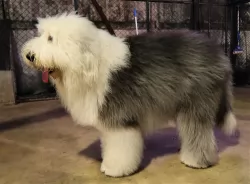 The origin of the Old English Sheepdog is unclear as records weren’t kept. However there are some aspects that suggest the dog originated in the 19th century and that the Scottish Bearded Collie had a significant part in the development of this dog which hails from England.
The origin of the Old English Sheepdog is unclear as records weren’t kept. However there are some aspects that suggest the dog originated in the 19th century and that the Scottish Bearded Collie had a significant part in the development of this dog which hails from England.
It is also believed that the Russian Owtchar was involved in the development of the Old English Sheepdog. The dog was recognized by the American Kennel Club in 1888. In 1904, the Old English Sheepdog Club of America was also founded.
The shape of the dog has changed very little over the years and it was in the 1880s that the dog was exported to the United States.
 The Irish Setter is a gun dog, originating in Ireland and recognized by his beautiful red or mahogany coat.
The Irish Setter is a gun dog, originating in Ireland and recognized by his beautiful red or mahogany coat.
Descending from the Setter group, the Irish Setter, also known as the Red Setter, has a solid pedigree. It was in the 1800s that they were brought to the United States.
The Irish Setter wasn't always what it looks like today and in fact the solid red color was created because of selective breeding practices. The Irish Setter has long medium length floppy ears, brown eyes and he is deep chested.
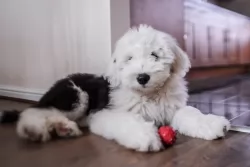 The Old English Sheepdog is a large dog standing at between 50 and 60cm and weighing between 27 and 45kg.
The Old English Sheepdog is a large dog standing at between 50 and 60cm and weighing between 27 and 45kg.
He is muscular with a broad bottom and hip area. The head is also large and the small ears are carried flat. The tail has always been docked, giving the dog a large panda-bear look to him, but these days the tail is often left long, and the dog loses that square compact look.
When the tail is left long it is well feathered. The coat can become fairly long and is quite harsh and wavy to straight. The coat is essentially grey with white hair over the head area. The puppies are born with their hair being black and white, and later on the traditional grey coloring comes in.
What is quite interesting with this dog is that it stands lower at the shoulder than at the loins, so just like a Panda bear, he also lopes or walks in a bear-like fashion.
The Old English Sheepdog isn’t an aggressive dog. He is social, intelligent and entertaining for his human family, whom he loves to spend time with.
He is an energetic dog too and he would prefer a country setting where there are large fields to run in as opposed to living on a tiny property in the city. He is an adaptable dog though, and will slot into life in the city or suburbs, so long as he is well exercised.
Train him and socialize him and he will become an obedient, amicable pet to have around.
 The Irish Setter is a large dog, beautiful and elegant looking, standing at 61 to 71cm in height and weighing anything from 25 to 34kg, males and females.
The Irish Setter is a large dog, beautiful and elegant looking, standing at 61 to 71cm in height and weighing anything from 25 to 34kg, males and females.
The coat is a rich red color and is short to medium length but feathers in places such as the tail, the chest and abdomen, the legs and the tail. The head is long and lean, the ears are long and silky and the tail long and feathery.
The Irish Setter is a playful, friendly, sweet, mischievous, high energy dog who makes a superb family pet, getting on well with children in the home.
It was noticed that in about 1845, Setters in Ireland were mostly red, red and white or even a mustardy-lemon type of color, but there was preference for the solid red coloring. The breed standard for the modern Irish Setter was drawn up in Dublin by the Irish Red Setter Club and approved in 1886.
The dog was essentially bred for hunting game birds, using their excellent sense of smell to locate the bird. He is an alert, intelligent dog and will learn easily. Training and socialization will make him obedient and relaxed.
He isn't an assertive kind of breed and therefore isn't going to make the best of watchdogs. They've got such amicable, kind temperaments that they make popular therapy dogs.
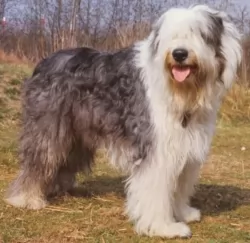 The Old English Sheepdog is the ideal dog for a family pet. They love spending time with their human family and are affectionate and loyal, getting on well with children as well as other pets.
The Old English Sheepdog is the ideal dog for a family pet. They love spending time with their human family and are affectionate and loyal, getting on well with children as well as other pets.
From the time he is a puppy, you can see that he is fun-loving and easy going while also being intelligent. He is also a guardian and wants to protect his human family.
Provide him with the opportunity to get out into the country sometimes if you don’t live on a farm because he is essentially a farm dog. He used to be a herding dog and likes to be busy. Treat him well and have him trained and socialized and he’ll make you a superb pet.
 Irish Setters are going to make you a wonderful pet. He has a friendly, confident disposition that makes them ideal pets for families with children who have been taught how to respect- and be kind to animals.
Irish Setters are going to make you a wonderful pet. He has a friendly, confident disposition that makes them ideal pets for families with children who have been taught how to respect- and be kind to animals.
He is a big dog, but with training and socialization he becomes well behaved and obedient. Social and outgoing, this is a dog which just loves the companionship of their human family and will require a good deal of exercise too.
Keep him well exercised, feed him good food that promotes health, give him a nice warm, dry place to sleep and he’ll fit perfectly well into your family and make a splendid pet.
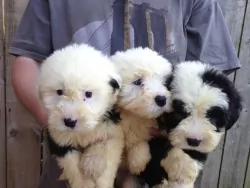 It is estimated that the beautiful Old English Sheepdog can live to be about 10, 11 or 12 years of age if he is looked after well. Just like with other dog breeds though, this particular dog is also prone to some of the common dog diseases there are.
It is estimated that the beautiful Old English Sheepdog can live to be about 10, 11 or 12 years of age if he is looked after well. Just like with other dog breeds though, this particular dog is also prone to some of the common dog diseases there are.
Some of these diseases include hip dysplasia, diabetes, eye diseases and deafness along with some skin problems.
As a chronic disease, Diabetes can affect dogs as well as other animals and humans. Diabetes in dogs can’t be cured but it can be managed, with Diabetes Mellitus being the kind of diabetes most seen in dogs. Whatever kind of diabetes your pet has, the negative effects remain the same.
It can be devastating when your dog has been with you for about 10 years, to discover that he has cancer. Of course, cancer is the leading cause of death found in dogs older than the age of 10.
Many cancers are curable if you catch them early. Malignant lymphoma is a common cancer with dogs but there are other cancers too. The warning signs of cancer in dogs are much the same as what you get with humans. You’ll discover a lump or even an injury that won’t heal. There could also be abnormal bleeding.
There are many different kinds of skin problems seen in dogs, some of which are more common than others. You’ll notice your dog licking a part of the body so that the hair disappears and the skin becomes exposed.
There are skin problems started because of inadequate diet and lack of nutrition. There are plenty of commercially manufactured pet foods that don’t have the right amount of vitamins and minerals your pet needs. Always buy a good quality one to fight these very aggravating skin allergies. A vet may give hydrocortisone products but many dog owners these days try to treat their dogs with natural products.
 Irish Setters are quite a healthy breed but they are also prone to getting some of the common dog illnesses such as hip dysplasia, cancer, bloat and canine leukocyte adhesion deficiency.
Irish Setters are quite a healthy breed but they are also prone to getting some of the common dog illnesses such as hip dysplasia, cancer, bloat and canine leukocyte adhesion deficiency.
Known as CLAD, this is a disease of the immune system found in Irish Setters. True, it is a rare disease and affected animals show signs of skin lesions, bone disorders, anorexia and generalized lymphadenopathy.
Irish Setters can develop bloat, a life-threatening condition where the stomach distends with gas and can twist. This is known as gastric torsion and you’ll see your dog’s restlessness. He may even ‘hide away’ somewhere, lying down and drooling, while trying to vomit. This is an illness which requires immediate veterinary intervention.
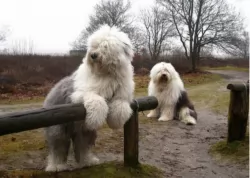 Food allergies are caused by your dog eating food with ‘bad’ ingredients which don’t agree with him. Make sure your pet has a wholesome diet.
Food allergies are caused by your dog eating food with ‘bad’ ingredients which don’t agree with him. Make sure your pet has a wholesome diet.
Invest in the very best quality commercially manufactured food. Home-made food is always a wonderful treat for any dog but it needs to be kept simple. No exotic, spicy foods and no suddenly changing your pet’s diet.
Simple, nutritional boiled chicken, brown rice or pasta and vegetables such as sweet potato, carrots and spinach added into his kibble as a treat will do wonders for your pet and he will thank you for keeping his meals tasty and simple. A little bit of raw meat added in occasionally can also do him the world of good. Fresh, cool water must always be available.
The Old English Sheepdog is quite a high maintenance dog, what with that long hair and all, and some owners of this dog prefer to take him to the parlor to have the hair sheared and wash, otherwise it could become a mammoth task for a dog owner.
If you opt to keep the hair long, you may end up having to be constantly brushing your pet’s coat to prevent it tangling. Not only that, if you live in a hot area, cutting the hair can help towards keeping the dog cool.
The ears of your dog should be checked regularly for infection as well as the eyes, and keep the nails clipped as well.
 Irish Setters are lean and muscular and an active breed. They love nothing more than to run off in wide open spaces, and if you live in the city and have a large garden, he will need to be taken on long walks. If he is a country dog, he may well run off and be gone for an hour or two before he returns home.
Irish Setters are lean and muscular and an active breed. They love nothing more than to run off in wide open spaces, and if you live in the city and have a large garden, he will need to be taken on long walks. If he is a country dog, he may well run off and be gone for an hour or two before he returns home.
They are dogs which are used to having a job to do such as hunting, so he won't do well if he is put into a small back yard and left to his own device. He is a social dog and wants to be with his human family, relying on them to include him in all their activities.
Your Irish Setters is a lean, muscular, active dog, and to keep him that way he will require a nutritious diet. If you feed him commercially manufactured kibble, make sure it is the very best quality one. It is a good idea to mix in protein such as cooked chicken, brown rice and vegetables. Some raw meat added in from time to time can be very beneficial to him too.
With your beautiful Irish Setter, it is best to avoid feeding your dog processed foods altogether. A good diet is essential for good health. Never leave your dog without a constant supply of cool, fresh water.
The Red Setter’s coat is fairly long on the body but short and smooth on the head. The coat will need to be brushed at least twice a week to prevent matting.
Trim his nails as needed, and find out how to keep his teeth healthy too with vet approved canine dog toothpaste- and brush.
Also check his long, floppy ears because it is so easy for ear infections to develop with these long-eared dogs.